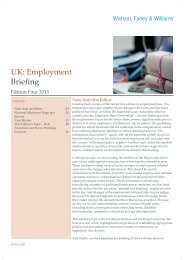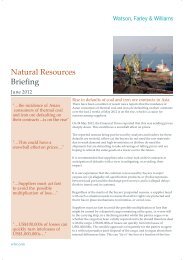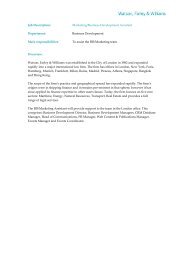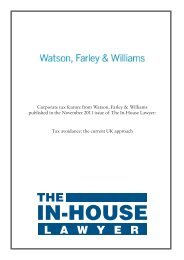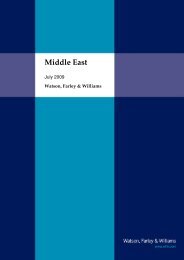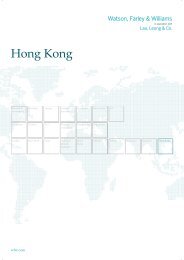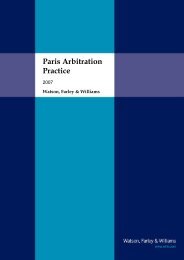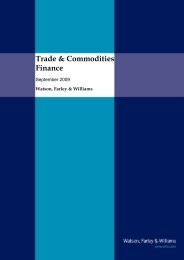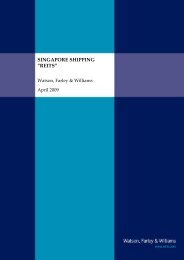Investment Treaty Update - Watson, Farley & Williams
Investment Treaty Update - Watson, Farley & Williams
Investment Treaty Update - Watson, Farley & Williams
Create successful ePaper yourself
Turn your PDF publications into a flip-book with our unique Google optimized e-Paper software.
“THE DESIRE FOR TRANSPARENCY OFTEN CLASHES WITHTHE PRESUMPTION OF CONFIDENTIALITY USUALLYATTACHING TO THE ARBITRAL PROCESS, WHICH MANYPRACTITIONERS ASSUME SHOULD APPLY EQUALLY TOTREATY ARBITRATION.”Transparency in <strong>Treaty</strong> ArbitrationConfidentiality is one of the main features and advantages ofinternational commercial arbitration, and flows from the natureof arbitration as a private process between private partiespursuant to an express agreement to resolve disputes that way.In investor-state treaty arbitrations, however, the arbitration isprimarily founded upon a treaty and/or national legislativeprovisions rather than upon a negotiated dispute resolutionagreement between the parties. Furthermore, the general publicinterest in investor-state disputes, as well as states’ generalduty of accountability, influence the character of the arbitration.Accordingly, the development of investor-state arbitrations overthe past decade has given rise to calls for greater transparencyin these proceedings. The desire for transparency often clasheswith the presumption of confidentiality usually attaching to thearbitral process, which many practitioners assume should applyequally to treaty arbitration. It may also conflict with theintegrity of the arbitral process as a means of achieving a fairresolution of the dispute.In Biwater Gauff (Tanzania) Limited v United Republic ofTanzania, an eminent ICSID tribunal attempted to balance theconflicting requirements of confidentiality, transparency andprocedural integrity. The tribunal was called upon to clarifythese issues in circumstances where the parties wereconducting media campaigns against each other, in a disputewhich attracted, and continues to attract, general media, NGOand public interest.In 2005, a dispute arose between Biwater Gauff (Tanzania) Ltd(“BGT”), a joint venture company, and the United Republic ofTanzania (“Tanzania”). BGT alleged that in 2005 Tanzaniaexpropriated its investment when the government repudiated acontract with BGT’s Tanzanian subsidiary (City Water) for theprovision of water and sewerage services, deported City Water’ssenior management, seized the company’s assets, occupied itsoffices and took over its business. BGT commenced ICSIDarbitration proceedings against Tanzania in August 2005. InMarch 2006 the tribunal held its first session and in May 2006it issued procedural order No.2 for the production ofdocuments.Shortly afterwards, Tanzania unilaterally “leaked” the minutes ofthe first session and a copy of the procedural order No.2, bypublishing them on the internet. Tanzania’s Counsel admittedbeing the origin of the “leak” and subsequently declined to givean undertaking not to disclose BGT’s recently filed pleadings,the exhibits attached thereto or any of the nine files of materialproduced by BGT in compliance with procedural order No.2.BGT applied for interim relief seeking to protect theconfidentiality of these documents.The issue raised by BGT’s application was delicate. On theone hand, BGT argued that the disclosure of such documentsbreached Tanzania’s obligations to observe the proceduralintegrity of the arbitration and not to aggravate the dispute.On the other hand, Tanzania argued that it had consistentlyadvocated the importance of transparency in this dispute,and that neither the ICSID convention nor the ICSIDArbitration Rules authorised the restrictions on transparencysought by BGT.The tribunal found that the media campaigns conducted by theparties and the general public and media interest in the disputewere sufficient threats to the procedural integrity of thearbitration, and gave rise to a concrete risk of aggravation andexacerbation of the dispute, requiring restrictions on thetransparency of the proceedings. However, in view of the publicnature of the dispute, the tribunal decided that any restrictionson transparency had to be carefully and narrowly defined. Thetribunal ordered that, in the absence of agreement, the partiesshould refrain from disclosing to third parties numerouscategories of documents produced in the arbitration (includingpleadings, disclosure and records of hearings). However, thetribunal allowed the parties to apply for these restrictions to belifted or varied on a case by case basis. It further ordered thatits decisions, orders or directions other than awards were not tobe disclosed to third parties, but allowed the parties to seek itsprior permission to do so. Finally, the tribunal reminded theparties that they were entitled to engage in general discussionabout the case in public, provided that any such publicdiscussion be restricted to what was necessary, and not beused as an instrument to antagonise the other party, exacerbatetheir differences, unduly pressurise a party, or render theresolution of the dispute potentially more difficult.Confidentiality v TransparencyThe tribunal noted that in the absence of any agreementbetween the parties on confidentiality or transparency, and inthe absence of relevant provisions on either issue in anapplicable BIT, there was no provision imposing a general dutyof confidentiality in ICSID arbitration, whether under the ICSIDConvention, the ICSID Administrative and Financial Regulations,the ICSID Arbitration Rules, the UNCITRAL Arbitration Rules orotherwise. Whilst these instruments ensure the privacy ofhearings, and provide for the publication of awards subject tothe parties’ consent, none expressly provides for theconfidentiality of pleadings, documents or other informationsubmitted by the parties during the arbitration. The tribunalTHE INVESTMENT TREATY UPDATE WATSON, FARLEY & WILLIAMS ARBITRATION GROUP 05



